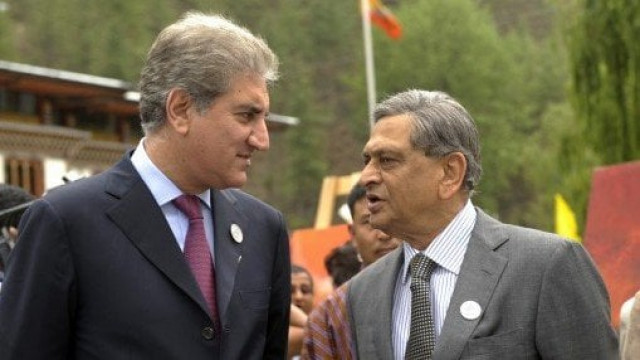What we should expect
Speculation is abound over talks between Indian External Affairs Minister S M Krishna and Shah Mahmood Qureshi.

What we should expect
There is speculation about the agenda – more specifically how much weight will be given to issues such as water. The Mumbai Attacks still cast a long shadow over the talks, and have dominated all discourse between the two countries since.
What will be discussed, will there be a conclusive outcome of any sort? What should people on both sides of the border expect?
Khursheed Kasuri, former foreign minister of Pakistan, who was active in the back channel diplomacy between the two countries during the tenure of the last government weighs in on some of the points:
“The water situation is assuming alarming proportions. Public opinion in Pakistan holds India responsible (for the water issue). In some ways, this (public opinion) can play into the hands of extremists, more dangerously than the Kashmir issue,” he said while speaking to Express 24/7.
“The situation in Afghanistan is also very important. Pakistan-India rivalry comes into play with Afghanistan,” he further said, adding, “Pakistan has also been complaining about Indian interference in Balochistan.”
“They will talk on substantive issues,” he said, but warned against expecting too much from the meetings: “Pakistan-India talks are not about an event. They are a process. The nature of our relationship is such that ties will never remain on an even keel. They will either improve or deteriorate. I do have hopes, it is essential that both countries start meaningfully addressing each other’s concerns.”
“One lesson both sides must learn from previously failed dialogues is that the peace process should be irreversible,” he urged.
Meanwhile, Saurav Shukla, a visiting correspondent from Headlines Today feels that, “Terrorism will definitely be on top of India’s agenda.” While speaking to Express News, he stressed that India want the accused of the Mumbai attacks in Pakistan to be prosecuted quickly. But he also added that India wants to have discussions on all issues that are brought to the table. Commenting on the outcome of the talks, he said that they may yield results such as relaxing restrictions on cross-LoC trade, finalising the schedule of the commerce secretaries’ meeting, etc, he said.
Hassan Askari, an analyst in Pakistan was more cautious. Speaking to Express News, he said that “Until we know what India is thinking about the talks, predicting the outcome is very difficult. Pakistan’s strategy is that all issue are on the table to be discussed. Pakistan wants comprehensive dialogues to be restarted. However India has in the past stressed on terrorism as the main issue, and has tried to keep all other issues in the background. We have to see whether we can bridge the gap in our respective approaches.”
Pakistan’s concerns
Pakistan is expected to raise the issue of human rights violations in Kashmir, especially in light of increased violence there in recent days
Pakistan will also try to revive composite dialogue
Water will feature prominently in the talks, as the Kishenganga dam and the Sir Creek issue are a sore point for Pakistanis
India’s concerns
Trial of the seven accused in the Mumbai attacks case is moving at a slow pace. India would like to see its expeditious and successful conclusion.
India expects Pakistan to act on confessions by terror suspect David Coleman Headley over the Mumbai terror attack
New Delhi seeks to bridge the ‘trust deficit’ that plagues the two nations, says Indian Foreign Secretary Nirupama Rao
Published in The Express Tribune, July 15th, 2010.



















COMMENTS
Comments are moderated and generally will be posted if they are on-topic and not abusive.
For more information, please see our Comments FAQ